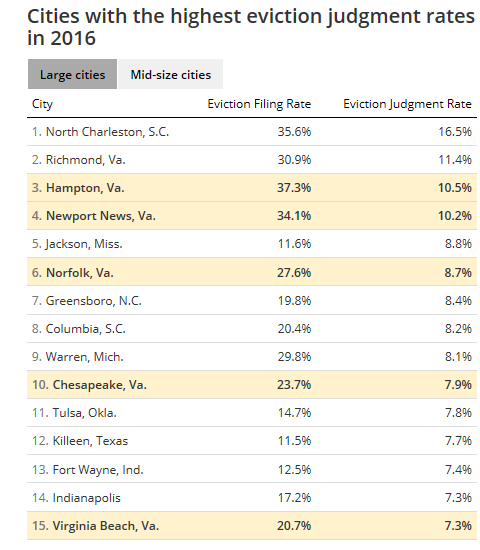
Half of the 10 U.S. Cities With the Highest Eviction Rates Are in Virginia
The above statement is the conclusion from Princeton University’s Eviction Lab. Following publication of the Lab’s findings, many articles have appeared in Virginia newspapers with headlines that read … 'Rather than ruin someone's life with an eviction, divert them out of the system': Effort afoot to help those who are behind in rent stay in their home
- Richmond Times Dispatch, 6/24/18
Housing and advocacy groups launch campaign to lower Virginia's high eviction rate
- Richmond Times Dispatch, 5/22/18
Why eviction rates in Hampton Roads are among the worst in the United States
- The Virginian Pilot, 4/13/18
Here’s a quick summary of the Princeton University’s Eviction Lab findings.
Large cities are defined to have a population greater than 100,000.
Source: The Eviction Lab
Built by Will Houp | The Virginian-Pilot
Immediate reactions from state and local leaders and advocacy groups include:
- Discussions of an eviction diversion program to help people behind on rent to stay in their homes
- Review of “longstanding, inequitable” state housing laws and policies
- Extend current right of redemption longer than its current one right in a 12-month period
- Staff eviction proceedings with a pro bono, third party lawyer to serve as mediator
In this article we’ll take a look at the Princeton University’s Eviction Lab numbers as well as how evictions work in the Commonwealth of Virginia.
Princeton University’s Eviction Lab Numbers
There is no question about the accuracy of the numbers presented in the above chart. Clearly, the Princeton University’s Eviction Lab research appears comprehensive and well documented. It is worth noting that the figures shown do not reflect how many people were physically evicted from their homes … only how many went through the courts to the point that a Judgment for the Right to Evict be granted. This is a significant difference from what newspaper headlines suggest. There does not seem to be reliable data about the percentage of judgments for the right to evict that actually result in an eviction. However, there is some evidence that while eviction was not the motivating factor, many tenants move before the sheriff initiates eviction proceedings. The distinction is a move legally forced by the landlord and one initiated by the tenant. Additionally, there is anecdotal suggestion that the vast majority of those presented with a judgment for the right to evict come to a mutually agreed-to resolution with the landlord and remain in their home.
How Evictions Work in Virginia
The Virginia eviction statute has something for both landlords and tenants. From the landlord’s side, strict compliance is the order of the day to be successful in the eviction process. That means following the proper steps as mandated in the Virginia Residential Landlord and Tenants Act. The following is intended as an overview of the Virginia eviction process – not a comprehensive “how-to” guide.  While landlords are often irritated by the detailed rules of Virginia eviction statutes, it becomes more palatable when you consider the significant stakes for the tenant – loss of home and shelter. That puts the eviction legal procedure in a more significant and urgent light when compared to civil cases that involve business or money. While some accounts seem to suggest that some landlords would prefer to forcefully remove a tenant from the property … change the locks, turn off the utilities and put the tenant’s belongings by the side of the road … that’s not going to legally happen in Virginia … nor would it be in the best interests of either party. Landlords want to be paid rent when due and not pursue a costly and time-consuming collection or eviction process. Tenants want to maintain the stability of their residence and enjoy peace of mind that they are secure in their home. That said, there are two events that may trigger an action to evict the tenant – non-payment of rent and non-compliance with lease obligations. Note: At any stage in the following discussion of steps in the eviction process, a tenant may halt the proceedings by paying past due rent, correcting lease violations or otherwise reaching a mutually agreed-to resolution with the landlord. The eviction process may be described in three distinct scenarios – the Easy Way, the Harder Way and the Hardest Way.
While landlords are often irritated by the detailed rules of Virginia eviction statutes, it becomes more palatable when you consider the significant stakes for the tenant – loss of home and shelter. That puts the eviction legal procedure in a more significant and urgent light when compared to civil cases that involve business or money. While some accounts seem to suggest that some landlords would prefer to forcefully remove a tenant from the property … change the locks, turn off the utilities and put the tenant’s belongings by the side of the road … that’s not going to legally happen in Virginia … nor would it be in the best interests of either party. Landlords want to be paid rent when due and not pursue a costly and time-consuming collection or eviction process. Tenants want to maintain the stability of their residence and enjoy peace of mind that they are secure in their home. That said, there are two events that may trigger an action to evict the tenant – non-payment of rent and non-compliance with lease obligations. Note: At any stage in the following discussion of steps in the eviction process, a tenant may halt the proceedings by paying past due rent, correcting lease violations or otherwise reaching a mutually agreed-to resolution with the landlord. The eviction process may be described in three distinct scenarios – the Easy Way, the Harder Way and the Hardest Way. 
Scenario 1 - Easy Way
Non-Payment of Rent: Landlord delivers to the tenant a Pay or Quit Notice stipulating that the rent is to be paid within five days or vacate the premises. If the overdue rent is paid, the tenant may remain in the premises. Alternatively, the tenant moves out.Non-Compliance with Lease Obligations: Examples of these types of lease violations includes operating a business on the premises, unauthorized pets or persons residing on the property or excessive noise. Landlord delivers to the tenant a Notice to Quit which gives the tenant twenty-one days to correct the refusal to comply or vacate the premises thirty days from the date the tenant was served with the notice. If tenant remedies the issue, the tenant may remain in the premises. Alternatively, the tenant moves out. Lease violations that are criminal acts or seriously endanger the health or safety of others may result in the landlord serving an Immediate Notice of Termination. Examples of such activities are manufacturing, sale or use of narcotics, acts of violence or brandishing a firearm. 
Scenario 2 – Harder Way
Tenant Does Not Pay Overdue Rent and/or Does Not Remedy Lease Obligation Non-Compliance: Landlord provides proof to the court that proper notice was given and files a Summons for Unlawful Detainer. The tenant will be summoned for an initial hearing or appearance. If the tenant admits the landlord’s allegations, or fails to appear, the landlord’s choice is to request an immediate Writ of Possession as well as a judgment for unpaid rent.
Scenario 3 – The Hardest Way
Tenant Denies Scenario 2 Allegations: The court sets a trial date to determine whether the landlord has legal grounds to evict the tenant. Typically, the judge will instruct the landlord to explain in writing the landlord’s claim to be entitled to possession and judgment for unpaid rent. In kind, the tenant may be instructed to provide a written explanation of why the landlord’s claims are not valid. In Virginia, tenants may present, among others, the following types of defenses to the landlord’s claims.
- The landlord’s allegations are false.
- Failure of the landlord to remedy a condition in the premises that presents a hazard to safety or health.
- Improper service of the eviction process.
- Violation of the Fair Housing Act.
- Retaliation for the tenant filing a complaint to a government agency.
- Failure to comply with steps to cure violations to the housing code.
In the event the judgment of the court is in the landlord’s favor, the tenant has ten days to appeal this ruling and post a bond that generally includes all the money owed to the landlord plus anywhere from a few months up to a year’s rent. Prior to final judgment of the appeal, the tenant may pay the landlord all unpaid rent, late fees, court costs and attorney’s fees and remain in the premises; however the tenant may exercise this right only once every twelve months per landlord. If the tenant does not appeal or the landlord wins the trial (or appeal), the judgment becomes final. It is only then that the landlord may forcibly remove the tenant from the premises. If the tenant refuses to leave, the landlord may request the court to issue a Writ of Possession to the Sheriff’s office to schedule the eviction day and give notice of the eviction date to the tenant. The landlord must appear on the date of the eviction to remove the tenant’s personal belongings and to change the locks in the presence of a supervising Deputy Sheriff. 
Takeaways
Clearly, the eviction process may be lengthy and difficult and one to be avoided by both landlords and tenants. There are considerable checks and balances that allow both parties adequate time and remedies to come to a resolution short of eviction. As noted above, tenants at any stage in the eviction process may halt the proceedings by paying past due rent, correcting lease violations or otherwise reaching a mutually agreed-to resolution with the landlord. Perhaps the Immediate reactions from state and local leaders and advocacy groups referenced earlier in this article may well have merit. Questions, concerns and final recommendations for action will best be formulated against an existing frame of reference … currently Virginia has a robust eviction statute with protections and remedial options for both landlords and tenants.






